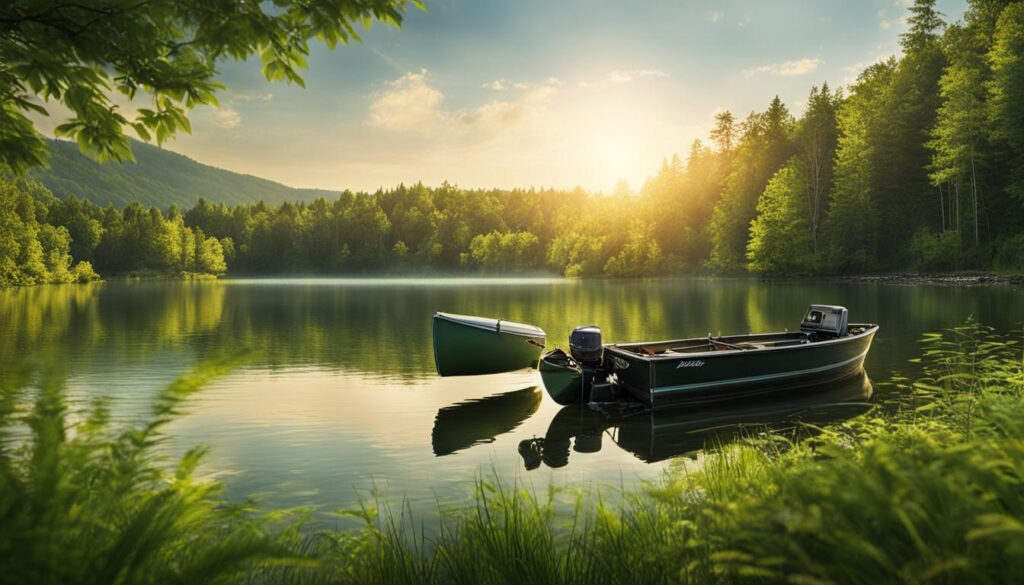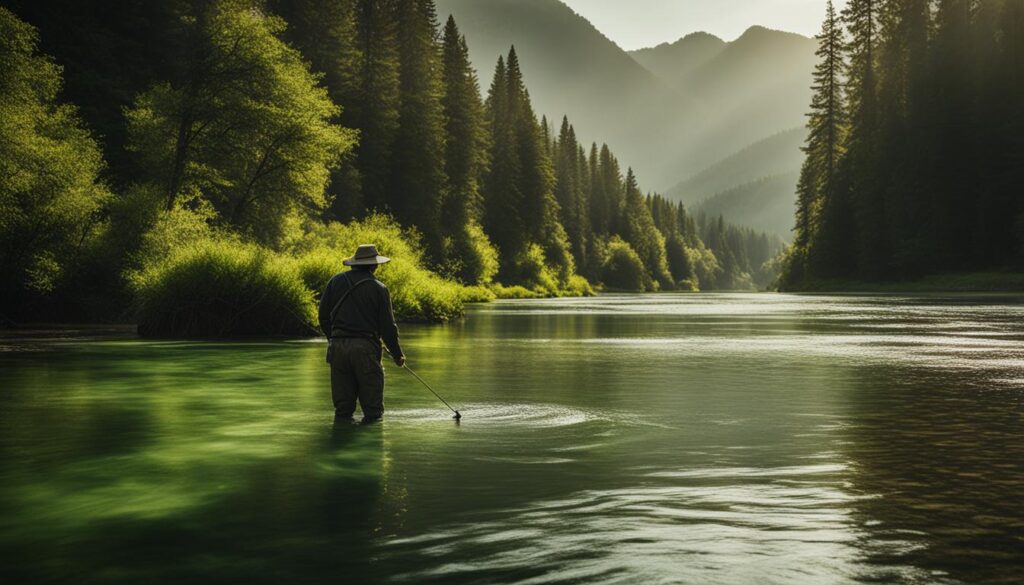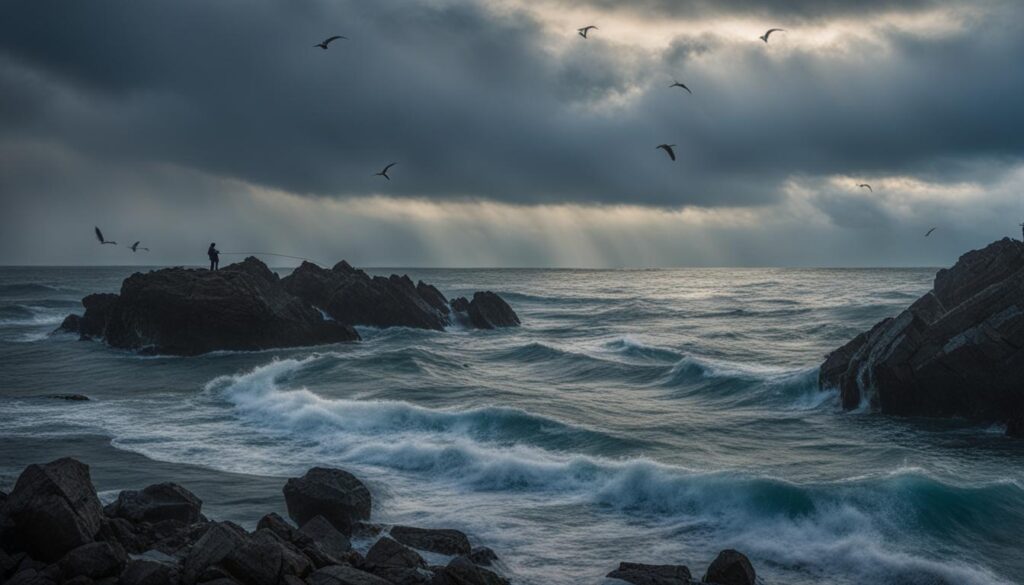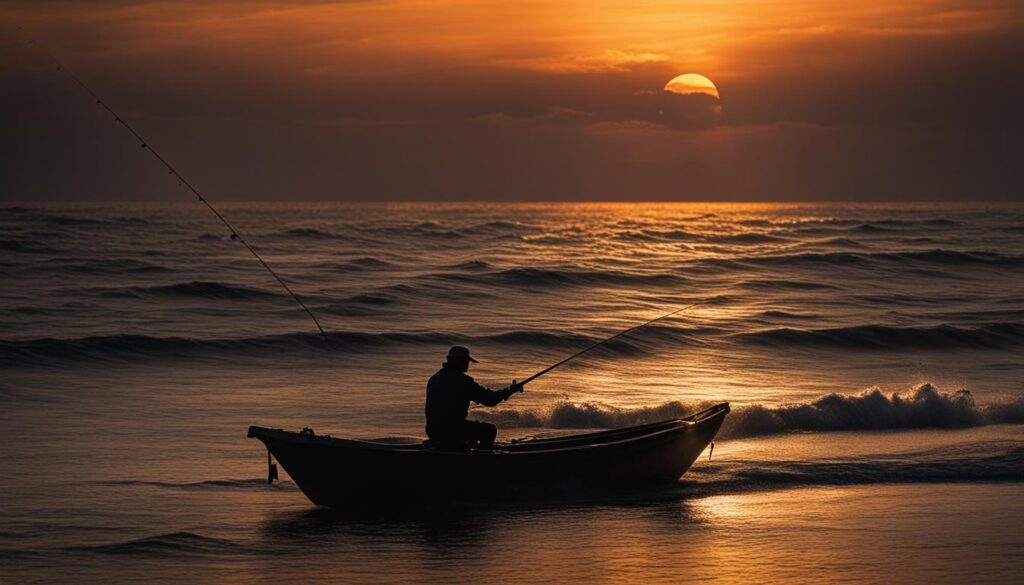We may earn money or products from the companies mentioned in this post.
Are you planning your next fishing trip? Whether you’re a seasoned angler or a beginner, proper planning is crucial for a successful and enjoyable experience. In this ultimate guide to fishing trip planning, we will provide you with all the necessary information to make your next fishing trip count.
Key Takeaways:
- Proper fishing trip planning is essential for a successful and enjoyable experience.
- Whether you’re a seasoned angler or a beginner, these tips and tricks will help ensure that your next fishing adventure is a success.
- By following the steps outlined in this ultimate guide, you’ll be well-prepared with the right gear, knowledge of the best fishing spots, understanding of licenses and regulations, consideration of weather conditions, and helpful fishing tips and techniques.
- Don’t forget to plan your fishing trip budget as well to ensure a well-rounded experience.
- Now go out there and make your next fishing trip count!
Finding the Best Fishing Spots
Finding the best fishing spots is crucial to the success of your fishing trip. Here are some tips to help you find the perfect destination:
- Research online for popular fishing trip destinations and read reviews from other anglers.
- Ask for recommendations from local bait and tackle shops or fishing outfitters.
- Consider the type of fish you want to catch and choose a location known for that species.
- Pay attention to factors such as water temperature, clarity, and depth when selecting your fishing spot.
Some of the best fishing spots in the United States include:
| Destination | Fish Species | Best Time to Visit |
|---|---|---|
| Kenai River, Alaska | Salmon, Rainbow Trout | June to August |
| Florida Keys, Florida | Bonefish, Tarpon, Permit | March to June |
| Montauk, New York | Striped Bass, Bluefish, Fluke | May to October |
| Lake Erie, Ohio | Walleye, Smallmouth Bass | May to September |
Remember to check the local fishing regulations and obtain the necessary licenses before embarking on your trip. With these tips, you’ll be sure to find the best fishing spot for your next adventure.
Essential Fishing Gear Checklist
Before embarking on your next fishing trip, it’s important to ensure that you have all the necessary gear for a successful and enjoyable experience. Here is a comprehensive fishing gear checklist to help you pack all the essentials:
| Fishing Rods | Fishing Reels | Fishing Lines | Fishing Hooks | Baits and Lures |
|---|---|---|---|---|
| Freshwater rod | Spinning reel | Monofilament line | Bait hooks | Live bait or plastic worms |
| Saltwater rod | Baitcasting reel | Braided line | Jig hooks | Jigs or spoons |
| Fly rod | Fly reel | Fly line | Circle hooks | Flies |
In addition to the fishing basics, there are a few other important items you should bring:
- Fishing net
- Tackle box or bag
- Fishing pliers or scissors
- Sunscreen and insect repellent
- First aid kit
- Water and snacks
- Appropriate clothing and footwear for the weather and terrain
By using this fishing gear checklist, you can ensure that you have everything you need for a successful and memorable fishing trip.
Understanding Fishing Licenses and Regulations
When planning a fishing trip, it is essential to familiarize yourself with the specific fishing licenses and regulations for the location you will be fishing in. Fishing licenses and regulations vary by state and sometimes even by specific fishing locations, so it is crucial to research and understand the requirements for your trip.
Obtaining a fishing license is typically easy and can be done online or in person at a local license retailer. The price of a fishing license varies depending on the state and the length of time you plan to fish, so make sure to check the state’s regulations for pricing information.
Fishing licenses are typically required for anyone over the age of 16, but age requirements may vary by state. Certain states also offer free or reduced-cost licenses for seniors or military members, so be sure to research these options if they apply to you.
It is also important to understand the specific regulations for the location you will be fishing in. These regulations are put in place to protect the fish and their habitats, so following them is essential for responsible and sustainable fishing. Regulations may include catch limits, size limits, and protected species, so make sure to research and adhere to these regulations to avoid fines or other penalties.
“It is crucial to research and understand the requirements for your trip.”
By understanding and following fishing licenses and regulations, you can help preserve the natural resources and ensure a successful and enjoyable fishing trip.
Considering Weather Conditions for Fishing Trips
When planning a fishing trip, it’s essential to take weather conditions into account. The right weather conditions can increase your chances of catching fish, while undesirable weather can ruin your trip. Here are some factors to consider:
- Temperature: Fish are cold-blooded creatures, so water temperature affects their behavior. In general, fish are more active in warmer water.
- Wind: Wind can have a significant impact on fishing. It can create currents that fish use to feed, but strong winds can make it difficult to cast and control your line.
- Precipitation: Rain can cool down the water and cause fish to move to shallower areas. However, heavy rain can also make it difficult to fish and decrease visibility.
To interpret weather forecasts, you can use online tools such as the National Oceanic and Atmospheric Administration’s website or apps like FishWeather. You can also consult with local fishing guides or bait and tackle shops for advice on the best weather conditions for specific fishing spots.
Fishing Tips and Techniques for Success
Fishing is an incredible outdoor activity that provides both relaxation and excitement. However, catching fish can sometimes be challenging. In this section, we will share valuable fishing tips and techniques that can improve your chances of catching fish.
Best Fishing Times
Fishing at the right time of day can make all the difference. As a general rule, the best times for fishing are early in the morning and late in the afternoon or evening. Fish tend to be more active during these times, giving you a better chance of catching them.
However, it’s also essential to consider the specific location you’ll be fishing at, as well as the season and weather conditions. For example, if you’re fishing in saltwater, the tide cycle can impact your chances of catching fish.
Fishing Charters
For an enhanced fishing experience, consider booking a fishing charter. Fishing charters provide everything you need for a successful fishing trip, including a knowledgeable captain, top-quality equipment, and access to the best fishing spots.
Additionally, fishing charters can be an excellent option for those who are new to fishing or want to learn specific techniques. The captain can provide guidance and tips throughout the trip, improving your chances of catching fish and honing your skills.
Fishing Techniques
There are many different fishing techniques that can increase your chances of catching fish. Here are some popular techniques:
- Baitcasting: A technique where you cast the bait with a baitcasting reel.
- Fly Fishing: A technique that uses a specialized fishing rod and artificial flies as bait.
- Trolling: A technique where you cast a line with bait from a moving boat.
- Bottom Fishing: A technique where you drop the bait to the bottom of the water to catch fish that dwell in deep waters.
- Topwater Fishing: A technique where you cast the bait on the surface of the water to attract fish that feed near the surface.
Each technique requires different gear and skills, so it’s essential to research and practice before your fishing trip.
Conclusion
In conclusion, planning a successful fishing trip requires a lot of preparation and consideration. One vital aspect that you should never overlook is budgeting. It’s crucial to set a budget for your trip to avoid overspending and to ensure that you have a great time without breaking the bank.
When planning your fishing trip budget, consider all the expenses that you will incur, including transportation costs, accommodation, and food. Research the prices of fishing gear rentals or purchases and factor them into your budget. Knowing your budget before the trip will help you make informed decisions on where to stay, what gear to buy or rent and how much to spend on food and other activities.
It’s also essential to be realistic with your budget. Don’t overspend on things that are not necessary and remember to leave some room for unexpected expenses. A little bit of flexibility in your budget will help you handle unforeseen circumstances without feeling overwhelmed or stressed out.
In summary, budgeting is a critical part of planning your fishing trip. With proper budgeting, you’ll have a great time without worrying about financial strains. So, take time to plan your budget, and you’ll enjoy your fishing trip to the fullest!
FAQ
How can I find the best fishing spots for my trip?
To find the best fishing spots for your trip, it’s essential to research and discover top fishing locations. Consider factors such as the type of fishing you prefer (freshwater or saltwater), species you want to target, and reviews or recommendations from fellow anglers. Online fishing forums, fishing guides, and local bait shops can also provide valuable insights.
What gear do I need to bring on a fishing trip?
Before heading out on your fishing trip, make sure you have all the necessary gear. This includes fishing rods, reels, lines, hooks, baits, tackle boxes, pliers, a fishing net, and appropriate clothing and footwear. It’s also essential to carry safety equipment, such as life jackets and a first aid kit.
Do I need a fishing license? How do I obtain one?
Fishing licenses are required in most states and specific fishing locations. To obtain a fishing license, visit your state’s fish and wildlife agency website or visit a local license retailer. The process typically involves filling out an application, providing identification, and paying the required fee. Be sure to familiarize yourself with any regulations or restrictions associated with the license.
How do weather conditions affect fishing trips?
Weather conditions can significantly impact fishing trips. Factors such as temperature, wind, and precipitation can affect fish behavior and feeding patterns. It’s important to consider weather forecasts and choose the best time to go fishing based on these factors. Generally, stable weather conditions with mild temperatures and moderate wind are conducive to successful fishing.
What are some tips for a successful fishing trip?
To improve your chances of catching fish, consider the following tips: research and plan ahead, choose the right bait and equipment for the target species, learn and practice different fishing techniques, pay attention to local fishing regulations and size limits, and be patient and observant while on the water. Additionally, considering a fishing charter can provide expert guidance and access to prime fishing spots.
Affiliate Disclosure: This post may contain affiliate links. If you purchase through our link, we may receive a small commission, but at no additional cost to you. For more information, please see our Disclosure statement.



